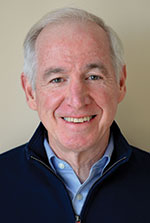Reflection / John Shaughnessy
One word and one choice define all of us
 As our car spun out of control, it quickly struck me that this could be the way life suddenly ends for my wife, two of our children and me.
As our car spun out of control, it quickly struck me that this could be the way life suddenly ends for my wife, two of our children and me.
We were traveling on a busy interstate highway late on a winter’s night years ago when our car hit a stretch of black ice. After several 360-degree rotations in the darkness, I kept expecting another car or semi-trailer to crash into us—and kept praying it wouldn’t happen. Finally, we slid off the road and slammed into a snow bank. Still, we were safe.
Oblivious to the danger we had just escaped, one of our then-small sons shouted with joy from the back seat, “That was so cool, Dad! Can we do that again?!”
Yet even that joyful innocence couldn’t shake the vulnerable feeling I had. Righting our car, I drove to the next exit and found the nearest motel for the night.
I’ve been thinking about moments of vulnerability more these days ever since the word “vulnerable” has become so prevalent during the coronavirus crisis. It’s been heavily used to describe people 65 and older, and those with health issues that make them more susceptible to the life-threatening impact of the disease.
Still, here’s the reality: In regard to life in general, if you were searching for one word that connects people of all ages and all backgrounds, “vulnerable” would be one of the defining choices.
That reality has become especially clear as the world has seemingly spun out of the control recently.
Beyond the people who have been labeled as “vulnerable” during the coronavirus crisis, that feeling extends to the millions of people of all ages who have been furloughed or lost their jobs.
That feeling is also there in the people who have been deemed “essential”—the health care workers, the grocery store employees, the delivery people and others—who worry about their increased exposure to the disease and who fear bringing it home to their families.
And it’s leaving its mark on students in grade schools, high schools and colleges. They not only saw their spring rituals and activities taken away, they’re also more uncertain now—like most of us—about what the future holds for them.
In fact, one-third of Americans are showing signs of clinical anxiety or depression due to the pandemic, according to a recent report from the U.S. Census Bureau.
The reality of feeling vulnerable also permeates every part of the race-related concerns and problems that have erupted again recently.
People of brown and black skin color feel vulnerable because of the prejudices, injustices and senseless deaths that have continued as part of their reality in this country.
People in law enforcement—a dangerous and stressful line of duty—have a higher risk of suicide than any other profession.
People who live in areas torched by riots and violence fear for their safety.
Being vulnerable is so much a part of our humanity that Christ suffered in agony in the Garden of Gethsemane and the Apostles hid in a room following Jesus’ death.
Yet there is often a choice when we reach a place of vulnerability. It’s a choice of self-interest or a greater good.
Christ and the Apostles chose the greater good, and their choices changed the world. During the pandemic and the recent race-related conflicts, many people have also made choices seeking a greater good.
For some, it’s the simple effort of wearing a mask. For others, it’s caring for someone touched by a disease. For some, it’s a protestor reaching out to hug a police officer, or a police officer kneeling or locking arms in unity with a protestor. For others, it’s being unrelenting in making sure all the facts of a confrontation come to light.
On the morning after our car spun out of control, the feeling of being vulnerable stayed with my wife and me. Still, we continued on the journey home, buoyed by the light of a new day, and intently focused on the road ahead and where we hoped to end up together.
We all fall under the definition of “vulnerable” in some way, but we all can choose to define our lives differently.
In a world seemingly spinning out of control, may our shared vulnerability become a bond we hold onto, a bond that strengthens us.
(John Shaughnessy is the assistant editor of The Criterion and the author of Then Something Wondrous Happened: Unlikely encounters and unexpected graces in search of a friendship with God.) †
 As our car spun out of control, it quickly struck me that this could be the way life suddenly ends for my wife, two of our children and me.
As our car spun out of control, it quickly struck me that this could be the way life suddenly ends for my wife, two of our children and me.